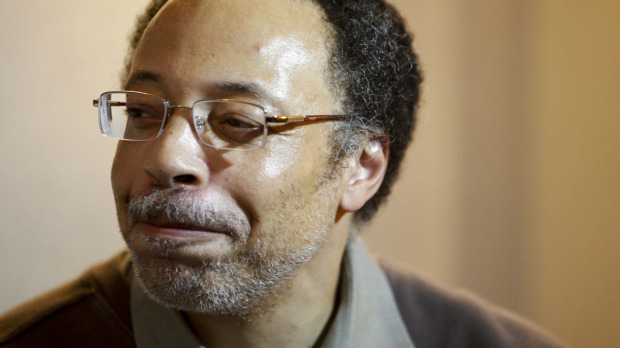Like this article? rabble is reader-supported journalism. Chip in to keep stories like these coming.
The annual Tommy Douglas Institute at George Brown College invites stakeholders from classrooms to communities to dialogue, debate and advance ideas on educating for change in the twenty-first century.
Past speakers Henry Giroux, Judy Rebick, and Chris Hedges have spoken to themes of social citizenship, critical pedagogy and resistance to neoliberalism.
On Thursday May 19, Canada’s Parliamentary Poet Laureate George Elliott Clarke will deliver the opening address on this year’s theme, Canada: A Different Story.
From the challenge of detangling a national culture from our multicultural mosaic (we prefer the mosaic) to the interminable riddle of Canadian identity (we’re doing okay so far), the story of Canada has long been tied to a need to make sense of Canada.
We know the popular stereotypes: Polite, quiet and apologetic. Hockey-obsessed and endlessly conversant on snow, beer and moose, (eh!). Further afield it’s the global peace-keeping, sometime environmentalist, whose Maple Leaf acts as a type of disclaimer to the stars and stripes of our superpower cousin (at least back-packers seem to think so).
We are also the land of the Charter, Immigration and official Multiculturalism and, thanks to Tommy Douglas, universal health care.
From French-English battleground to the liberal good society or 21st century resource powerhouse, there’s certainly no shortage of ideas about who we were, are and should be. Competing visions were centre-stage during last year’s federal elections. They will be again for next year’s sesquicentennial.
But, as Thomas King warns in The Truth About Stories, “you have to be careful with the stories you tell. And you have to watch out for the stories that you are told.”
He’s right of course.
In all of this there continues to be a painful and persistent absence. Again and again, from playhouse to Parliament and from newsroom to classroom, the story too often told is one that sanitizes Canada of its sins, distills it of its complex diversities, while exiling its oppressed and minoritized to the margins of history, or leaving them out entirely.
For those whose stories fall into the vacuum of historical misrepresentation, omission or forgetfulness, the consequences are dire and give rise to what Lee Maracle describes in Memory Serves as that “bizarre sense of history that shaped this continent….[A] grotesque mythology.” One that strikes so many from the record and thus from their own sense of nationhood and belonging.
History is nothing like what is reported. / (Hard to drain light from mud.) / Trumpets don’t usher in Heaven./ Truth blinds, but Deceit dazzles. / Flames that don’t gleam are smoke. / Manure gerrymanders gardens: Eden flowers from shit. / Fine wine refines urine./ Politics is PREJUDICE./ Behind these black letters? White bone, invisible breath./ Bread is eternal. / But your words?
(George Elliott Clarke, Experience 1: 1-9 / Zurich, Switzerland, 2011)
A seventh-generation Nova Scotian of African-American and Mi’kmaq descent, George Elliott Clarke’s work has focused on themes of justice, race, love and identity within Africadian experience.
If the need to tell Canada’s story is inseparable from the need to tell our own stories, then Clarke’s body of work is very much a demonstration of this. From his impressive collection of poetry, including the award-winning Execution Poems to his most recent novel The Motorcylist, Clarke traces Canadian history through that of his own family and community.
Nations, like nature, rarely grow from the top and thanks to artists, activists and writers like Clarke, Maracle, King, Kazimi (thankfully the list is long), peoples’ histories, or what E.P. Thompson referred to as “histories from below,” have become essential to national narratives that strive to be more inclusive, honest and just. They assert their presence while speaking back to privileged centres. They tell different stories and tell stories differently.
[W]e managed to cling to threads of memory and we are busy weaving those threads into a new fabric. (Maracle, Memory Serves, 2015)
They also ask questions.
How do the awful silences surrounding genocide and slavery impact today’s Indigenous and racialized communities? When resistance is written out of history, how do we learn about the possibilities of social transformation? When the uglier bricks of colonial capitalism are separated from the project of nation-building, can we even begin to trust history for an honest account?
Now as we reconcile ourselves to horrific truths about the residential school system, while welcoming those seeking refuge from afar, Canada’s past, present and future are up for interrogation, confrontation and telling our many stories.
Canada: A Different Story is not about revising history, it’s about restoring it.
In addition to Clarke’s keynote address, the Tommy Douglas Institute will feature performances, activist led roundtable discussions and a conversation on Changing the Narrative with poet/author Lee Maracle and filmmaker/writer Ali Kazimi.
On Thursday May 19, join us for a day of storytelling about Canada.
To register, visit georgebrown.ca/TommyDouglasInstitute
Resh Budhu, Coordinator of The Tommy Douglas Institute, has worked in social justice issues of gender equality, anti-racism, education and the arts. Resh brings this commitment to her role as faculty in the Community Worker Program at George Brown College. For over 40 years, the Community Worker Program at George Brown College has prepared students to become critical supporters and advocates of community empowerment, social justice and the building of a better world.



